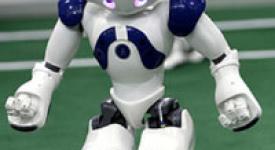Peter Stone Named 2011 Yahoo! Faculty Research and Engagement Program Recipient
09/21/2011 - Computer science professor Peter Stone has been named a 2011 Yahoo! Faculty Research and Engagement Program (FREP) recipient and has been granted a $10,000 gift for his proposal titled “Testing a Liquidity Sensitive Market Maker for a Prediction Market on the UT Austin CS Building Opening.”





